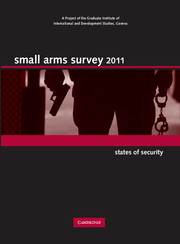Book contents
- Frontmatter
- Foreword
- Contents
- About the Small Arms Survey
- Notes to readers
- Acknowledgements
- Introduction
- Chapter 1 Larger but Less Known: Authorized Light Weapons Transfers
- Chapter 2 Fact or Fiction?: The UN Small Arms Process
- Chapter 3 Procurement and Policy: Police Use of Emerging Weapons Technology
- Chapter 4 A Booming Business: Private Security and Small Arms
- Chapter 5 Protected but Exposed: Multinationals and Private Security
- Chapter 6 Ethos of Exploitation: Insecurity and Predation in Madagascar
- Chapter 7 Reforming the Ranks: Public Security in a Divided Côte d'Ivoire
- Chapter 8 Securing the State: Haiti before and after the Earthquake
- Chapter 9 Balancing Act: Regulation of Civilian Firearm Possession
- Index
Chapter 5 - Protected but Exposed: Multinationals and Private Security
Published online by Cambridge University Press: 05 March 2012
- Frontmatter
- Foreword
- Contents
- About the Small Arms Survey
- Notes to readers
- Acknowledgements
- Introduction
- Chapter 1 Larger but Less Known: Authorized Light Weapons Transfers
- Chapter 2 Fact or Fiction?: The UN Small Arms Process
- Chapter 3 Procurement and Policy: Police Use of Emerging Weapons Technology
- Chapter 4 A Booming Business: Private Security and Small Arms
- Chapter 5 Protected but Exposed: Multinationals and Private Security
- Chapter 6 Ethos of Exploitation: Insecurity and Predation in Madagascar
- Chapter 7 Reforming the Ranks: Public Security in a Divided Côte d'Ivoire
- Chapter 8 Securing the State: Haiti before and after the Earthquake
- Chapter 9 Balancing Act: Regulation of Civilian Firearm Possession
- Index
Summary
INTRODUCTION
In November 2010, close to 60 private security providers signed an international code of conduct that committed them to ‘respecting human rights and humanitarian law in their operations’ (FDFA, 2010). The International Code of Conduct for Private Security Providers (ICoC) sets out standards in areas such as the use of force, vetting of private security personnel, and reporting of incidents. It emerged in response to alleged human rights abuses by private security contractors in conflict zones, and its creation reflects the growing scrutiny of private security companies (PSCs), particularly those employed by governments.
Another expressed aim of the ICoC is for PSC clients–‘be they states, extractive industries or humanitarian organizations’–to embed the code in their contracts (FDFA, 2010). Ideally, this goal should apply to multinational corporations (MNCs) in general, extractive and otherwise, as they are major consumers of private security, particularly in countries where the rule of law is weak and state-provided security is inadequate or non-existent. Even where the rule of law is well established, MNCs often employ PSCs to protect assets, personnel, and property.
And yet, despite the heightened attention to PSCs, and the frequency with which MNCs turn to private security, research on MNC use of PSCs is scarce. While MNCs clearly rely on private security providers to play an important role in protecting their operations, this relationship is not always straightforward.
- Type
- Chapter
- Information
- Small Arms Survey 2011States of Security, pp. 135 - 166Publisher: Cambridge University PressPrint publication year: 2011



